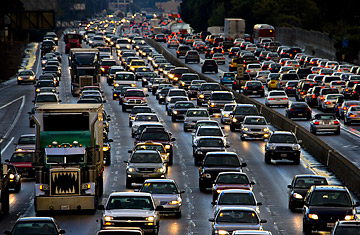
If you are behind the wheel of your car, someone may be on to you. More and more cities are equipping patrol officers, toll booths and even access roads with computer sidekicks that can keep track of vehicle movements. By doing so, they are changing the face of 21st century law enforcement — and sparking debate over privacy issues.
Automated license-plate-recognition systems (ALPRs) mounted in patrol cars are capable of processing 1,500 license plates a minute, capturing a vast amount of data about the movements of both criminals and law-abiding citizens. For police, ALPRs allow them to solve auto-theft cases, pick up wanted felons or monitor the movements of sexual predators. But privacy advocates fear the collected data may be mined for other purposes. For example, one side of a divorce case could potentially look through toll-plaza records for circumstantial evidence of adultery.
The scanners are a boon to police work, having an impact that is as significant as that of the police radio in the 1950s. "They truly are a force multiplier," says Sergeant Dan Gomez, the officer in charge of the Los Angeles Police Department's Tactical Technology Unit. In a typical 10-hour shift, Gomez says, a police officer traditionally could run perhaps 100 license plates through the system — calling the information in or typing into a computer, then waiting for a response. In comparison, says Gomez, the APLR system can process from 2,000 to 2,500 license plate "hits" per patrol car in that same 10-hour shift.
The scanners, which cost about $20,000 each, are mounted on a patrol car and use character-recognition software to read numbers and run them through databases. The LAPD has 26 scanners all over the city searching for stolen autos, cars associated with crimes and Amber Alert vehicles. In New Haven, Conn., police are using the scanners to track parking scofflaws, while Palm Beach County, Fla., uses the technology to follow gang members.
What concerns the American Civil Liberties Union and others is the accumulation and storage of the vast amount of data collected by the scanners. "We were disturbed when we began to see the technology used as a generalized surveillance tool," says Jay Stanley, a spokesman for the ACLU. Privacy advocates worry, for example, that the data could be used to examine who attended a political event or protest.
The LAPD's data storage is a particular concern, Stanley says. Before putting the scanners in the field, the department met with the ACLU and discussed concerns, according to LAPD Commander Patrick Gannon. "We would like to be able to use them for other things, but there was a lot of push back on that, and so they are limited to certain units and uses like auto theft," Gannon says.
However, the database is maintained so that it can be reviewed in Amber Alert cases or mined for leads in certain criminal cases. For example, if a detective in a bank-robbery case has a partial license-plate number, he or she can request a review of scans in the vicinity of the crime. Gomez says the request must go through well-defined channels and protocols; investigators cannot simply call up the data independently.
While the LAPD has one of the largest cadres of scanners, small towns are looking to the scanners to boost city coffers or serve as added eyes on the ground. The upscale city of Tiburon, Calif., across the bay from San Francisco, is studying whether to place a scanner at city limits as a resource in home-burglary cases. But in the traditionally liberal community, the prospect of border cameras has provoked debate. "To be under investigation simply because you entered or left Tiburon at a certain time is incredibly intrusive," Nicole Ozer, a technology expert for the California ACLU told the San Francisco Chronicle. "Innocent people should be able to go about their daily lives without being tracked and monitored."
Download the new TIME BlackBerry app at app.time.com.
